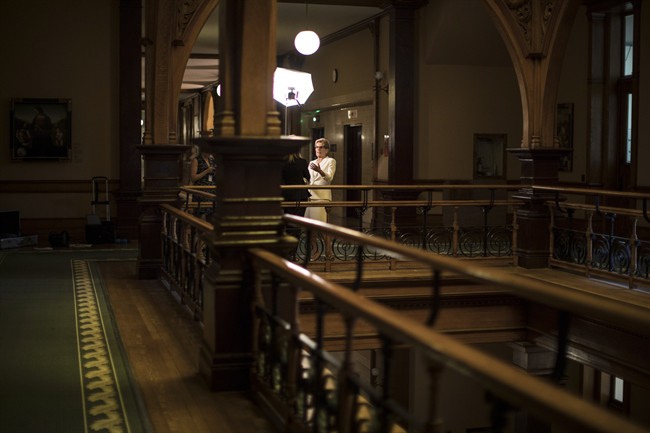Ontario Premier Kathleen Wynne’s pledge to hike the province’s minimum wage to $15 an hour is a victory for low-information government.

Wynne announced her plans this week to the delight of the NDP and labour groups, which have been advocating for this change for years.
The increase comes in the spirit of “fairness” rather than, you know, economics.
WATCH: Premier Wynne announces minimum wage to rise to $15 an hour

I didn’t tally the number of times Wynne said “fair” in her announcement, but had I turned it into a drinking game I’d likely be in an alcohol-induced coma.
“With these changes, every worker in Ontario will be treated fairly, paid a living wage and have the opportunities they deserve,” she said.
There are some reasonable reforms proposed, such as increased clarity surrounding employees classed as independent contractors and the guarantee of three hours of pay for employees whose shifts are cancelled with less than 48 hours of notice.
READ MORE: Who wins and who loses in Ontario’s decision to raise minimum wage to $15 an hour?
The most substantive change — the 32 per cent increase over the next year and a half to the minimum wage — is the most problematic.
It’s unsurprising that the Chamber of Commerce and Canadian Federation of Independent Business came out against the plan, but Wynne should pay attention. These groups represent the interests of small business at a time when the provincial government certainly doesn’t.
A few weeks ago, Wynne was trumpeting a 25-per cent hydro rate cut and now she’s increasing payroll expenses for many businesses by almost a third.
It may be difficult to make ends meet on $11.40 an hour — the current Ontario minimum wage — but invoking the emotional concept of “fairness” doesn’t change the black and white nature of the balance sheets of small companies, which must make decisions based on business rather than charity.
When the last minimum wage increase kicked in — smaller than the one on the table now — one restaurateur couple I know pegged the cost at nearly $15,000 a year, which meant not replacing one employee and working more hours themselves.
READ MORE: COMMENTARY: Is raising the minimum wage the right answer?
I once interviewed the late owner of an Exeter, Ont. doughnut shop who worked 14 to 16 hour days to compete with the Tim Hortons that opened beside him. He couldn’t compete if he raised his prices, but also couldn’t afford to keep up with rising payroll costs in the final years of his business, which closed when he died in 2015, at 55.
The industries where minimum wage earners are the norm are those whose employees require no specialized skills or education. Statistics Canada data say nearly six in 10 minimum wage workers are under 24. The second largest bloc is filled with people whose spouse works in a higher-paying job.
The Marxist fantasy of everyone making $50,000 per year may be comforting, but consider how much that cup of coffee, pack of gum or deli sandwich must cost to allow that.
After all, increasing prices is one of only two options employers have. The other is cutting costs, typically by reducing hours or even eliminating jobs.
READ MORE: Ontario to increase minimum wage to $15 an hour by 2019
Instead of raising the minimum wage, government should abolish it altogether.
In practice, minimum wages tend to be maximum wages. In Ontario, $11.40 is embraced as an industry standard in the service and retail sectors, not the starting point.
If that number were to disappear, employers and employees would be compelled to compensate based on genuine market value.
The knee-jerk response to that proposal is fear that some corporation might pay a mere $5 an hour. So what? If that’s what it costs to compete with a self-checkout machine, which as of yet doesn’t have a minimum wage (most likely because it can’t vote), then let’s celebrate a guaranteed job.
A low-paying job is better than none at all.
WATCH: Low-income Ontario workers rejoice, small businesses concerned as $15 minimum wage announced

Without a minimum wage, we’d find that people won’t work for nothing—or next to nothing—and companies that low ball will have to up the ante to attract good talent. Businesses that want the best will pay a premium. Customers looking for that will pay the extra cost because they’re getting something for it.
Where’s the extra value if costs go up because the government says so?
Small- and medium-sized businesses make up over 80 per cent of the Canadian workforce. These are the operations most hit by minimum wage hikes — not the McDonald’ses and Walmarts of the world.
Why are the do-gooders pushing for government to mandate a $15 hourly wage not calling on companies to offer it on their own?
READ MORE: How a $15 minimum wage could impact B.C.’s economy
If “fairness” is the goal, what then of fairness for business owners, many of whom plug away at a fraction of minimum wage because that’s the only way they can afford to stay in business?
You may not trust the market, but it’s the only force in existence reflecting the true will of the people, unadulterated by politics.
A truly ‘fair’ policy would be to let the market do its job — and let the people keep theirs.
Andrew Lawton is host of The Andrew Lawton Show on AM980 London and a commentator for Global News.








Comments